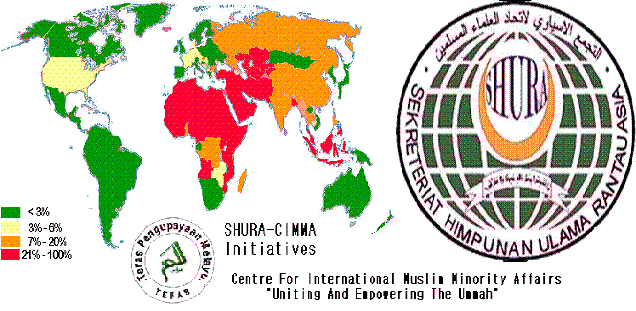Source : The Malaysian Insider
URUMQI, July 10 — Chinese authorities banned prayer gatherings at mosques here today, the principal day of prayer for Muslims, as security officials tried to prevent further ethnic violence in the Xinjiang region.
In another principal Xinjiang city, the ancient Silk Road oasis town of Kashgar, foreign journalists and other visitors were instructed to leave.
In another principal Xinjiang city, the ancient Silk Road oasis town of Kashgar, foreign journalists and other visitors were instructed to leave.
 Chinese soldiers in riot gear guard the entrance of Dong Kuruk Bridge mosque in the centre of Urumqi today. — Reuters pic
Chinese soldiers in riot gear guard the entrance of Dong Kuruk Bridge mosque in the centre of Urumqi today. — Reuters pic
Strictly enforced security was clearly high on the government’s agenda, and the People’s Daily, the Communist Party’s official newspaper, said in an editorial today that “to maintain social stability, we need to isolate and crack down hard on a handful of people.” The paper said those who “masterminded, organised and committed serious violence during the riot” should be targeted.
At least 156 people were killed in three days of rioting and unrest that began Sunday in Urumqi, the region’s capital. More than 1,000 were reported injured.
The People’s Daily editorial echoed the remarks of President Hu Jintao, who cut short a visit to the Group of 8 summit meeting in Italy. In a statement issued along with the Communist Party’s senior leaders, Hu called on the authorities to “isolate and deal a blow to the small group” who had a hand in the bloodshed.
“Preserving and maintaining the overall stability of Xinjiang is currently the most urgent task,” said Hu, according to a statement published by the official Chinese news agency.
The party chief of Urumqi, Li Zhi, offered even tougher words: “To those who have committed crimes with cruel means, we will execute them.”
The turmoil began at a southern Chinese shoe factory last month after Chinese workers, spurred by false accusations of rape, attacked Uighur co-workers, killing at least two. The government’s failure to aggressively prosecute those involved in the brawl became a rallying cry for Uighur students in Urumqi, who organised the protest last Sunday that turned violent.
Uighurs, who are Turkic-speaking Muslims, form a minority in Urumqi, a city of 2.3 million that has been heavily settled by ethnic Han Chinese from other parts of China. The influx of so many outsiders, and what many describe as Beijing’s heavy-handed rule, have helped foment resentment among Uighurs.
Urumqi appeared to be settling into an uneasy calm, and the ban on Friday prayers apparently was aimed at preventing large gatherings of Uighurs at the city’s mosques.
It was not clear if similar prayer bans were in force elsewhere in Xinjiang today.
As many as 20,000 troops from nearby regions had poured into Urumqi after the rioting began, forming cordons between ethnic Uighur neighborhoods and those dominated by Han Chinese, who had earlier gone on a revenge spree against Uighur residents.
Both Uighur and Han claim to be the predominant victims of the violence, but the government has declined to release a breakdown of the dead.
A nighttime curfew was in place in Urumqi, but shops began to reopen for the first time yesterday as thousands of anxious residents clogged the city’s bus and train stations seeking to escape the city. As helicopters hovered overhead, military vans roamed the streets with loudspeakers blaring slogans like “Maintain stability” and “Protect the people.”
Since the turmoil began on Sunday, China has accused Rebiya Kadeer, an exiled Uighur leader, of fomenting the strife. Kadeer, who lives in Washington DC, has denied the charge.
But on Wednesday, the government for the first time shifted some of the blame to the United States, which it accused of financing Ms. Kadeer’s organisation, the World Uygur Congress, and other groups that advocate human rights and democracy for ethnic Uighurs in China. The accusation appeared in an article in the People’s Daily.
In recent days Turkey, which has cultural and linguistic ties to China’s Uighurs, has stepped into the fray. Yesterday the minister for trade and industry called for a boycott of Chinese goods to protest the crackdown in Xinjiang. “If the country where we consume the goods does not respect human values, we should reconsider our values,” said the minister, Nihat Ergun, according to the Anatolia news agency. — NYT

No comments:
Post a Comment